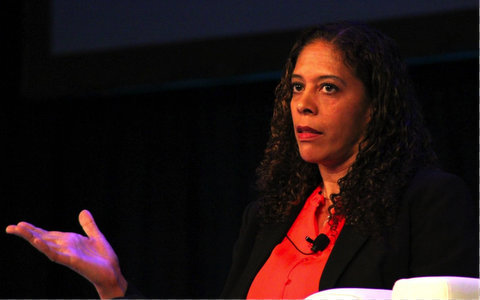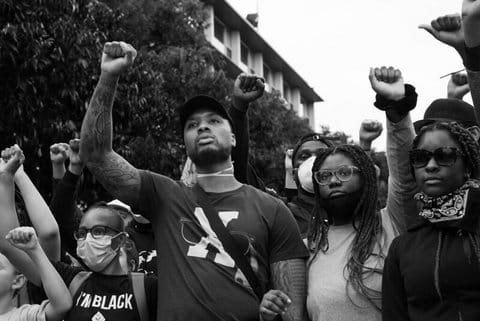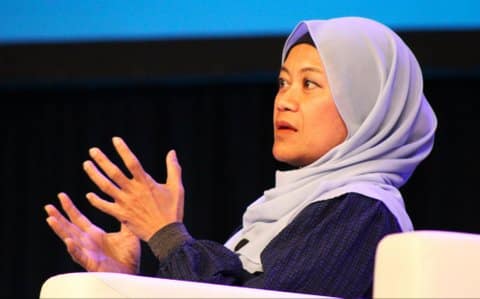
10 Jul Law Firms and Nonprofits Are Important Partners in Fight Against Hate

“It wasn’t an accident that the attack happened along the Freedom Trail,” said Licha Nyiendo, of Human Rights First, referring to an incident in which neo-Nazis beat a Black man. (Joe Porrello / The CC Pulse)
Editor’s note: The Eradicate Hate Global Summit began in 2021 in response to the mass shooting at the Tree of Life synagogue. Last year, The CC Pulse was there for the first time in service of our Stop the Hate coverage.
By Joe Porrello
PITTSBURGH — Legal representation for hate victims has been and will continue to be instrumental in reducing violent extremism, said experts on a panel at the 2023 Eradicate Hate Global Summit.
The issue is personal for one of the panelists, attorney Daniel Kramer, whose brother-in-law Dr. Jerry Rabinowitz was one of 11 victims of the 2018 Tree of Life Synagogue shooting in Pittsburgh.
Rabinowitz provided care for HIV patients at a time those infected often felt hopeless or mistreated by health professionals. Now, Kramer is helping victims like his brother-in-law by developing a firm with a group of lawyers dedicated to bringing cases against violent extremists.
When it comes to minimizing bigotry, litigation comes late in the process — and is only a small portion of the response — but remains crucial, says Kramer.
The law firm Kramer works for, Paul, Weiss, helped win $26 million in damages for people injured at the 2017 “Unite the Right” rally in Charlottesville, Va., and was part of the ruling that ended in the Proud Boys hate group paying more than $1 million for trespassing on the grounds of a 186-year old historically Black church and burning a Black Lives Matter sign in 2020.
Kramer said working with civil rights groups and nonprofits is key in the defense against violent extremism because they are an “incredible source of knowledge” with “boots on the ground.”
One such group is Human Rights First, a nonprofit that focuses on hate crimes through its Fighting Discrimination Program and its Extremism Policy Team.
A seasoned trial and appellate lawyer who previously served as commissioner for the New York State Division of Human Rights, Licha Nyiendo is the chief legal officer of Human RIghts First. The group recently partnered with private law firm Foley-Hoag in a case against the white nationalist militia Patriot Front — its members being sued for allegedly assaulting a Black man in Boston in 2022.
Musician Charles Murrell III was walking to play his saxophone in Copley Square — a common routine — when he says hundreds of neo-Nazis marching and banging snare drums picked him out of a crowd and beat him with homemade shields, according to Nyiendo.
Bloodied and hospitalized from his injuries sustained on the Freedom Trail over Independence Day Weekend, Murrell continues to deal with emotional pain, says Nyiendo.
“It wasn’t an accident that the attack happened along the Freedom Trail; I think Patriot Front planned it that way,” Nyiendo said.
According to Human Rights First, the court issued a notice of default to Patriot Front for failing to reply to the complaint.
Like Kramer, Nyiendo said the teamwork of law and advocacy working on human rights cases is pivotal. She says every nonprofit with ties to civil or human rights needs lawyers to offer pro bono services.
“So far, it’s been incredibly advantageous for my nonprofit to partner with a private firm,” she said. “They have tremendous resources they can offer.”
Nyiendo said it’s important that litigation is brought against a group rather than an individual to break down the movement’s foundation. Human Rights First also gets to the issue’s roots by disrupting the financial sources of violent extremists, using the assistance of an investigative firm donating its services to find the assets of hate groups.
Attorney Justin Herdman has been investigating and prosecuting domestic terrorists like Patriot Front for almost 20 years. He began as a member of the U.S. Department of Justice National Security Division, and started working in the U.S. Attorney’s office about a week after the Charlottesville, Va., riots in 2017.
Because Herdman was serving in the Northern Ohio Office, one of his first priorities was a neo-Nazi from Toledo, Ohio, who killed Heather Heyer and injured 35 others with his vehicle at the riots.
Of the many domestic terror threats that he saw in his new role, one type stood out.
“Prominent among them that I observed at the time were white supremacist, neo-Nazi threats,” he said.
Though, those threats were not necessarily a focal point for the FBI when Herdman met with them in 2017.
“I was surprised that when it came to investigations focused on white supremacists or neo-Nazis, I was told the cupboard was essentially bare,” he said. “I made it very clear this had to be a priority for us.”
Herdman said the FBI was shifting from mitigating international terrorism to keying in on domestic threats at the time but is now much more concentrated on U.S. hate group activity.
“It’s not necessarily perfect, and I’m sure there are regional disparities in how this is being approached by law enforcement,” he said.
Following his departure from the U.S. Attorney’s office in 2021, and the racially charged Buffalo, N.Y., grocery store shooting in 2022, Herdman appeared before the U.S. Senate Judiciary Committee to urge federal authorities to impede violent extremists by working closely with law enforcement in communities under threat.
As an example of how crucial law enforcement — and bystanders — can be in limiting hate-fueled violence, Herdman cited an online threat against a Jewish Community Center in Youngstown, Ohio, that was thwarted by local police.
An officer responding to an unrelated call was approached by a concerned citizen who showed them an online post with a photo of a man holding a Nazi-era machine gun with the community center in the background. The officer then relayed the information to the FBI.
“Within 36 hours, we were swearing on search warrants and moving to arrest this guy,” said Herdman. “Because the threat was so profound, we could not take a chance of leaving this guy on the street.”
The culprit — who was also photographed at the Charlottesville riots — was in police custody for about two years leading up to his arraignment. Sentenced to 41 months in prison, he was released after five months on conditions of release stating he must not associate, communicate or otherwise interact with anyone who promotes or discusses white nationalism or supremacy.
A line exists between what is and is not protected by the First Amendment that must be carefully balanced to bring litigation against violent extremists, according to Herdman.
“You want to do it legally within the balance of the Constitution, but law enforcement has to be in position to move forward on a case that’s triable under those circumstances,” he said.
Herdman pointed to cases like Reardon’s as an illustration for effectiveness and noted that obtaining convictions after acts of terror occur is too little too late: “You’ve already lost at that point,” he said.
James Felte with the Criminal Section of the Civil Rights Division in the U.S. Department of Justice says the problem and solution are bigger than any organization or even collaboration of initiatives.
“If you think about what hate groups and those individuals who espouse these ideologies are trying to do — they’re inherently divisive.” he said. “From a broader perspective, it requires us as a nation to come together and not tolerate these types of crimes.”
This resource is supported in whole or in part by funding provided by the State of California, administered by the California State Library in partnership with the California Department of Social Services and the California Commission on Asian and Pacific Islander American Affairs as part of the Stop the Hate program. To report a hate incident or hate crime and get support, go to CA vs Hate.





No Comments